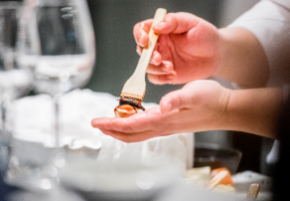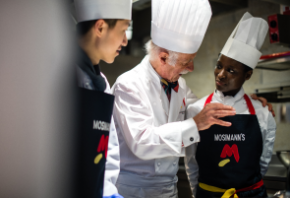- About
- Programs
- Campus Life
- Career Services
- Admissions
- News & Events
- Alumni
Time Management Tips for Students That Actually Work
Boost productivity and reduce stress with these proven time management tips for students. Start building better habits today!
Key Takeaways
- By adopting techniques like time blocking, the Pomodoro method, and daily prioritization, students can effectively manage their workload, avoid procrastination, and reduce feelings of overwhelm.
- Proper time management not only leads to better academic outcomes but also supports mental health and improves sleep quality by reducing last-minute work and allowing for more consistent rest.
- Mastering time management is not only essential for academic success but also highly valued by employers, making it an indispensable skill for future career growth and professional development.
Time is one of the most valuable resources a student can have—yet it often feels like there’s never enough of it. Between lectures, assignments, extracurriculars, and social life, the days can seem like a whirlwind.
So how do some students manage to juggle it all while others feel constantly overwhelmed? The answer lies in a powerful, often underestimated skill: time management.
Whether you’re preparing for exams, juggling part-time work, or simply trying to stay ahead of deadlines, applying some of the most effective time management tips for students can transform your experience and help you balance it all with ease.
What Is Time Management?
Time management is the ability to plan and control how you spend the hours in your day to effectively accomplish your goals. But it's more than just scheduling tasks or crossing things off a list—it’s about being intentional with your time, staying focused, and creating space for both productivity and rest.
When done right, time management helps you:
- Prioritize what matters most
- Reduce stress and procrastination
- Meet deadlines with confidence
- Maintain a healthy work-life balance
It’s a skill that grows with practice—and one that benefits not just your studies, but your future career and personal life as well.
Time Management Tips for Students
From proven techniques to mindful routines, these time management strategies are designed to help you take back control of your day and make the most of your student life.
Time blocking
Time blocking is a method where you divide your day into dedicated chunks of time for specific activities. Instead of multitasking or jumping between tasks, you focus on one activity per block—whether it’s attending a class, studying, exercising, or relaxing.
For example:
- 9:00–10:30 AM: Review lecture notes
- 11:00–12:00 PM: Group project meeting
- 2:00–3:30 PM: Assignment writing
By visually organizing your day, time blocking helps eliminate decision fatigue and improves focus. It’s especially helpful for students with tight schedules or those juggling multiple commitments.
The Pomodoro technique
If long study sessions drain your energy, the Pomodoro Technique might be your new best friend.
Here’s how it works:
- Choose a task to focus on
- Set a timer for 25 minutes and work without distractions
- Take a 5-minute break
- Repeat the cycle four times—these are called “Pomodoros”
- After completing four Pomodoros, take a longer break (15–30 minutes)
This method breaks your workload into focused, manageable sprints, helping you stay motivated, boost productivity, and avoid burnout. It's ideal for revision, reading, or writing assignments.
Prioritization with the Eisenhower matrix
The Eisenhower Matrix is a powerful tool for prioritizing tasks and managing time efficiently. Named after former U.S. President Dwight D. Eisenhower, who famously said, "What is important is seldom urgent, and what is urgent is seldom important," this matrix involves dividing tasks into four quadrants based on their urgency and importance.
- Do First: This quadrant includes tasks that are both urgent and important. Students should focus on completing these tasks promptly to prevent last-minute stress and potential setbacks.
- Schedule: Tasks that are important but not urgent fall into this quadrant. By scheduling these tasks for a later time, students can allocate proper planning and preparation, ensuring a more organized workflow.
- Delegate: In this quadrant, students find tasks that are urgent but less important. It is essential to consider delegating these tasks to others, thereby easing the workload and creating space for handling more critical responsibilities.
- Don't Do: Tasks that are neither urgent nor important should be discarded. Engaging in such activities wastes valuable time that could be better spent on more meaningful tasks.
By employing the Eisenhower Matrix, students can streamline their tasks, make informed decisions about how to allocate their time most effectively, and ultimately enhance their overall productivity.
The Tic-Toc method
Procrastination is a common challenge for students, often leading to increased stress and decreased productivity. The TIC-TOC Method, developed by David Burs, offers a structured approach to overcoming procrastination and enhancing efficiency.
- Identify: The first step is to recognize the important task that you have been putting off. Understand the reasons behind the delay and address any underlying anxieties or fears.
- Remove Distractions: Creating a focused environment is essential for overcoming procrastination. By eliminating sources of distraction, such as turning off social media notifications or finding a quiet study space, students can improve concentration and productivity.
- Improve Perception: The TIC-TOC Method involves rethinking your perspective on the task at hand. Break the task into smaller, manageable steps, set realistic objectives, and visualize successful completion. This approach will make the task seem less overwhelming and more achievable.
- Take Action: Initiate work on the task and maintain momentum by staying committed to the process. Often, taking that initial step can lead to a surge of motivation to continue and complete the task.
- Reward Yourself: Celebrate your accomplishments and progress, no matter how small. Rewarding yourself for completing tasks reinforces positive behavior and can help maintain motivation throughout your academic journey.
By applying the TIC-TOC Method, students can tackle tasks more efficiently, reduce their fear of failure, and experience greater satisfaction in their work.
Weekly planning sessions
Taking 30 minutes each Sunday to plan your upcoming week can set the tone for a productive, stress-free schedule.
Use this time to:
- Review upcoming deadlines and exams
- Map out major tasks and study goals
- Book time blocks for each task or subject
- Plan personal time for rest and hobbies
This bird’s-eye view keeps you prepared and prevents last-minute surprises. It also helps you stay in control of your academic journey rather than reacting to it.
Daily “Top 3 tasks” method
Every morning, write down your top 3 tasks for the day. These should be the most important or urgent things you need to complete—whether it’s finishing a paper, attending a tutorial, or reviewing lecture slides.
Focusing on three key tasks keeps your day achievable and focused. It prevents you from being overwhelmed and builds momentum as you check off meaningful goals.
The 2-minute rule for quick wins
Sometimes, your to-do list is filled with small tasks that take more mental space than time. The 2-minute rule helps clear those quickly.
Here’s how it works: If something takes less than 2 minutes to do—just do it now.
Replying to an email? Saving files from your last lecture? Adding a calendar reminder? These quick wins declutter your day and give you a sense of progress.
Digital minimalism to eliminate distractions
Let’s face it—notifications, endless scrolling, and digital clutter can steal hours of our time without us noticing.
Digital minimalism encourages you to be intentional with your digital habits by:
- Turning off non-essential notifications
- Keeping your phone in another room during study time
- Using website blockers for social media during focus hours
- Decluttering your digital workspace
By reducing digital distractions, you create more room for focused, meaningful work—and more time for offline experiences that recharge you.
Why Time Management Matters for Students
Good time management is more than just a productivity hack—it’s an investment in your personal growth and academic success.
Here’s what effective time management can unlock for you:
- Academic excellence: You’re better prepared for exams, assignments, and projects because you’ve made time for focused study and planning.
- Confidence: Meeting your goals on time boosts self-esteem and reduces the stress of procrastination.
- Balance: You create space for social life, personal development, and rest—all of which are vital for long-term success.
- Career readiness: Time management is one of the most sought-after skills by employers. Mastering it now sets you apart later.
Time is the one resource you can’t get back. Learning how to manage it well now—while you’re a student—will pay off long after graduation.
Take Control of Your Time, One Step at a Time
Mastering time management is one of the most impactful skills a student can develop. Not only does it enhance academic performance, but it also fosters mental well-being, better sleep, and a healthier work-life balance. By implementing techniques like time blocking, the Pomodoro method, and weekly planning, you can unlock your full potential as a student and set yourself up for success in your career.
At CAAS, we understand that time management is a crucial part of your educational journey. Our programs, designed for aspiring chefs, pastry experts, and culinary business leaders, are structured to help you manage your time efficiently while gaining the skills you need to thrive in the culinary industry.
Whether you're pursuing a Bachelor of Arts in Culinary Arts, a Master of Arts in Culinary Business Management, or a Swiss Diploma in Culinary Arts, our immersive, hands-on curriculum ensures that you learn how to balance creativity, business, and personal growth.
Ready to start managing your time—and your culinary career—better? Explore our programs at CAAS today and turn your passion for food into a thriving career.
Frequently Asked Questions (FAQs)
How does time management affect student mental health?
Effective time management helps reduce stress and anxiety by preventing last-minute cramming and overwhelming workloads. By staying organized and on top of tasks, students can create a sense of control and balance, leading to better mental well-being.
Can time management improve sleep quality for students?
Yes! By managing time effectively, students can avoid late-night studying and last-minute work, leading to more consistent and restful sleep.
Interested in studying at CAAS? Download our brochure to learn about our programs!
#Student Life























